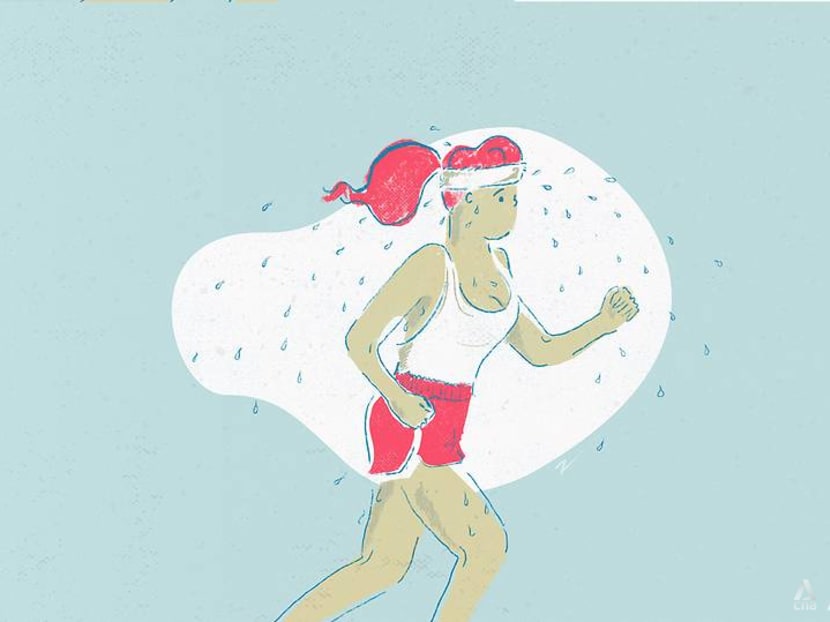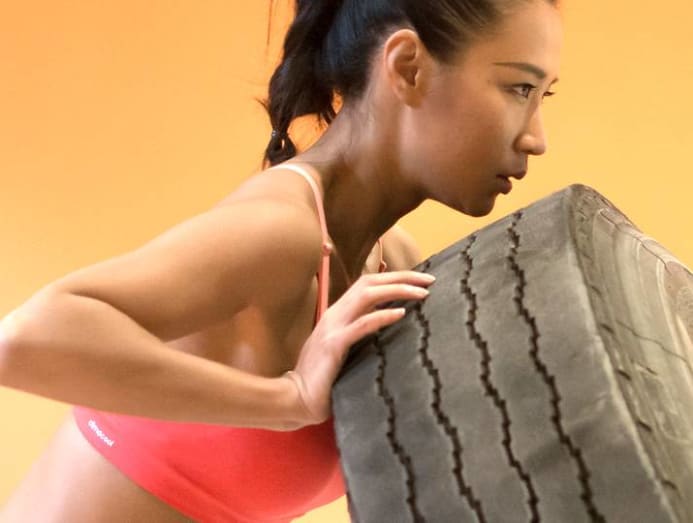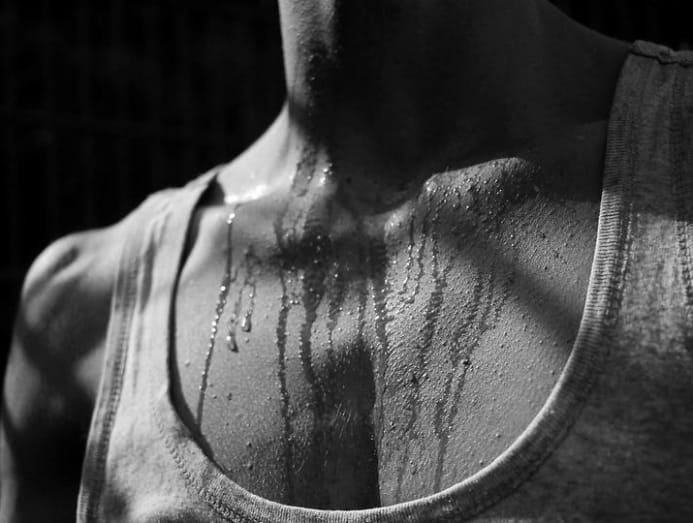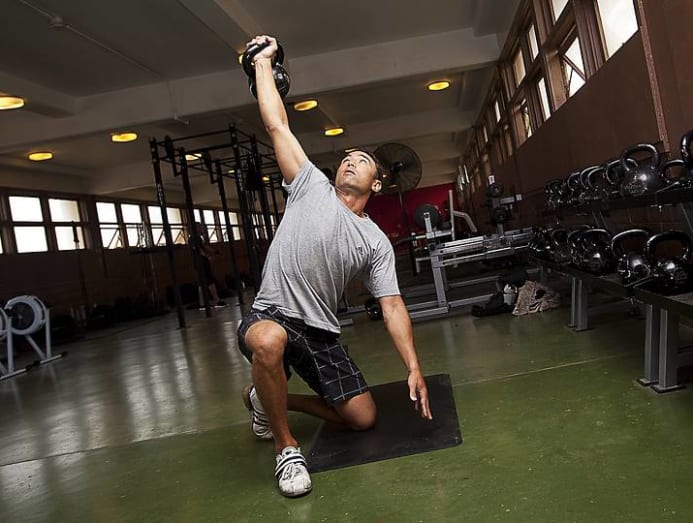Why do men sweat more than women? And do you burn more calories if you do?
CNA Lifestyle talks to experts about all things related to sweating – from debunking workout myths to reasons why it’s a good thing to why men are “wasteful sweaters”.

(Art: Chern Ling)
No one likes to sweat, especially when the humidity amplifies even the smallest amount of moisture. But if you’re wondering why you’re dripping like a water apparition while your gym buddy still looks (and smells) fresh after a serious session of boxing drills, give yourself a pat on the back.
No, seriously, you deserve it because it is a sign that your body – once you disregard how you look – is tuned like an F1 car to efficiently regulate your core body temperature.
READ: From CrossFit to HIIT: Are you at risk of injury at your overcrowded gym?
To begin with, sweating is our body’s way to cool itself down. Sweating more means you’re better at dousing the heat that your body generates when you move, said Ray Loh, senior physiologist with Tan Tock Seng Hospital’s Orthopaedic Surgery Department.
And if you’re wondering why the back of your shirt or top is often soaked through, even if it’s after a walk across the street for lunch, that’s because the upper back is the most sweat-prolific, said research associate professor Jason Lee with NUS Yong Loo Lin School of Medicine’s Department of Physiology.
“The volume of sweat generated varies very considerably between individuals. It could range from about 200ml to more than a litre,” he said.
It also depends on the activity you’re doing, added Loh. “For example, if you are running, your heart will be beating hard and fast, and you’ll produce more sweat around the chest.”

But for all that iron you’re pumping in the gym, the majority of the energy your body produces to perform the exercise (or any activity, for that matter) actually goes into generating heat, said Loh.
Consider this: When performing a task, 80 per cent of the energy produced by your body is lost in the form of heat generated. Only 20 per cent is translated into action, he said.
ARE YOU BURNING MORE CALORIES THE MORE YOU SWEAT?
Sorry to break it to you but sweating more doesn’t mean you’re burning more calories. Many people have this misconception as they notice some weight loss after a sweaty workout, but this is largely due to water loss.
According to Dr Joshua Li, registrar of Sport and Exercise Medicine with Changi General Hospital, "the maximum sweat rates of an adult can be up to 2kg to 3kg per hour".
Dr Lee busted the notion further. “It is a myth. You do not burn more calories with more sweating. It may feel harder to exercise because of the higher thermal strain, and not because more energy is being expended.”
Loh summed up the relationship between sweating and calorie burning this way: Burning calories produces heat, which in turn, causes your body to sweat to cool you down, so that you can continue with your exercise.
So, the level of calorie burning depends on the intensity of your activity – not the amount of sweat produced.
“Sweating is not a signal that you have exercised well,” said Loh. “Exercise benefits depend on the amount of work done, and fitness is not measured by the amount of perspiration.”

WHY YOU SWEAT MORE
The fitter you are, the easier you’ll sweat, said Dr Lee. “Fit individuals are very sensitive to heat as sweat evaporation is the main avenue of heat loss during exercise.
As such, when one starts to exercise and heat is produced as a result, the fitter one will attempt to cool down sooner.”
Conversely, the more sedentary and heavier you are, the more you will sweat as opposed to how easily the fitspo crowd gets sweaty.
You’ll require more effort – and therefore, produce more heat – to move a heavier person, explained Dr Lee. As a result, a bigger person will produce more sweat to help him or her dissipate the body heat, he said.
READ: To improve metabolic health, aerobic fitness may trump strength training
But while sweat is pouring out of the pores to help the individual cool down, a higher body fat composition can work against that effect, said Loh.
“Higher adipose fat tissues means heat is trapped in the body and the person perspires more during an exercise.”
Movement efficiency could be another reason. "A fitter person may be able to move more efficiently – for instance, a more proficient running gait, and better muscle strength and biomechanics – with lesser amount of effort," said Dr Li.
So, when a fitter person produces less heat, he would also produce less sweat.
Gender is another differentiating factor. “Men are known as wasteful sweaters,” said Dr Lee.
“They usually sweat more than what is required for them to cool off. Women seem to be more efficient in this regard – they sweat just enough.”
READ: Taking up running after 50? It’s never too late to start training
Testosterone is the reason behind men's excessive sweating. "It enhances the sweating response," said Dr Li.
"It has been suggested that the increased sweat rate in men is caused primarily by a marked increase in testosterone after puberty in boys."

If we were to rank people according to the amount of sweat they're likely to produce, from the most to the least, it would be trained males, trained females, untrained males and lastly untrained females, said Dr Li, citing a Japanese study that looked at gender and sweating.
"Untrained women had the worst sweating response of all, requiring a higher body temperature (or work intensity) than the other groups to begin sweating," he said.
CAN YOU – AND SHOULD YOU – MINIMISE SWEATING?
Unless you move away from the equator, “we will simply sweat earlier, and therefore, sweat more,” said Dr Lee. It is our body’s way of coping with the high humidity, he explained.
For that matter, he advises not to tinker with your body’s heat-regulating function to minimise sweating. “This is your body’s life saver as we embrace a warmer world,” he said.
As you'd already know, working out in an air-conditioned gym with lower humidity, is one way to reduce the sweating.
"For the same increase in core temperature, the body may not need to produce as much sweat in a dry environment, as compared to a person exercising in more humidity," said Dr Li.
In fact, it is not always a good sign if you find yourself sweating less. One reason could be that the workout’s intensity feels easy; another reason could be severe dehydration, said Loh.
On the flip side, sweating more could be caused by tiredness, insufficient recovery, overtraining, pain or injury, or more spicy food in your diet, he said.
If you must cool down to continue exercising or working in a warm environment, Dr Li recommended wearing loose clothes that are not skin-tight to allow heat to move away from the body.
"Pull up your hair so that sweat around the face and neck can evaporate quicker," he said, adding: "Wash off lotions and make-up on the face, hands and arms to prevent blocked sweat glands that can cause irritation and heat rash."
Loh recommended drinking cold water, or staying in shaded or cooler areas to reduce sweating. “Cooling yourself down can help you do more work and feel less tired."
It is also important to stay hydrated, said Loh. "Every litre of water lost through perspiration reduces sports performance significantly."





